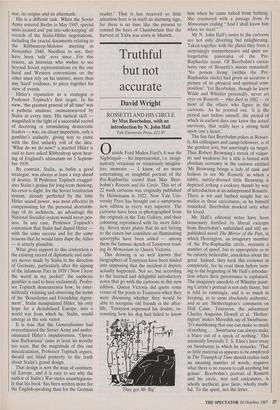Truthful but not accurate
David Wright
ROSSETTI AND HIS CIRCLE by Max Beerbohm, with an introduction by N. John Hall
Yale University Press, 172.95
0 utside Ford Madox Ford's It was the Nightingale — his impressionist, i.e. imagi- natively veracious or veraciously imagina- tive memoirs — I know of no more entertaining or insightful portrait of the Pre-Raphaelite crowd than Max Beer- bohm's Rossetti and his Circle. This set of 22 wash :cartoons was originally published by Heinemann in 1922. Now Yale Uni- versity Press has brought out a sumptuous new edition in every way superior. The cartoons have been re-photographed from the originals in the Tate Gallery, and their colouring reproduced with far more fidel- ity. Seven more plates that do not belong to the canon but constitute an illuminating apocrypha have been added — among them the famous sketch of Tennyson read- ing In Memoriam to Queen Victoria.
This drawing is so well known that biographers of Tennyson have been misled into supposing that the incident it depicts actually happened. Not so; but according to the learned and delightful introductory notes that go with the cartoons in this new edition, Queen Victoria did quote some verses of the poem to Tennyson When they were discussing whether they would be able to recognise old friends in the after- life: 'Tennyson expressed his doubts, re- counting how his dog had failed to know 'They got Mr Big'. him when he came naked from bathing. She countered with a passage from In Memoriam ending "And I shall know him when we meet": Mr N. John Hall's notes to the cartoons are not only diverting but enlightening.
Taken together with the plates they form a surprisingly comprehensive and quite un- forgettable panorama of the Pre- Raphaelite scene. Of Beerbohm's carica- tures one of Rossetti's nieces remarked: 'No person living (within the Pre- Raphaelite circle) had given so accurate a picture of its physical and spiritual com- position'. Yet Beerbohm, though he knew Wilde and Whistler personally, never set eyes on Rossetti — who died in 1882 — or most of the others who figure in the cartoons. As he pointed out, `it is the period just before oneself, the period of which in earliest days one knew the actual survivors, that really lays a strong hold upon one's heart.'
The fun that Beerbohm pokes at Rosset- ti, his colleagues and camp-followers, is of the gentlest sort, but unerringly on target.
Thus Robert Browning's streak of vulgar- ity and weakness for a title is hinted with absolute economy in the cartoon entitled 'Mr Browning brings a lady of rank and fashion to see Mr Rossetti' in which a tubby, nattily-dressed little Browning is depicted jerking a cockney thumb by way of introduction at an unimpressed Rossetti.
There is wit and barbed insight but no malice in these caricatures; as he himself remarked, Beerbohm mocked only what he loved.
Mr Hall's editorial notes have been immensely fortified by liberal excerpts from Beerbohm's unfinished and still un- published novel The Mirror of the Past, in which Herrington, an imaginary member of the Pre-Raphaelite circle, recounts a number of spoof, but so appropriate as to be entirely believable, anecdotes about the great. Indeed, they took this reviewer in completely, for he read them before turn- ing to the beginning of Mr Hall's introduc- tion where their provenance is explained.
The imaginary anecdote of Whistler paint- ing Carlyle's portrait is not only funny, but is told so cunningly, and is so much in keeping, as to seem absolutely authentic; and so are 'Hetherington's' comments on Hall Caine, Tennyson, the adventurer Charles Augustus Howell et al. 'Hether- ington' makes Meredith say of Swinburne: 'It's maddening that one can make so much of nothing. . . Swinburne can always make a blaze out of a speck of nothing.' This uncannily forestalls T. S. Eliot's later essay on Swinburne in which he remarks: 'That so little material as appears to be employed in The Triumph of Time should realise such an amazing number of words, requires what there is no reason to call anything but genius'. Beerbohm's portrait of Rossetti and his circle, text and caricatures, is wholly mythical; ipso facto, wholly truth- ful. To the spirit, not the letter.


























































 Previous page
Previous page